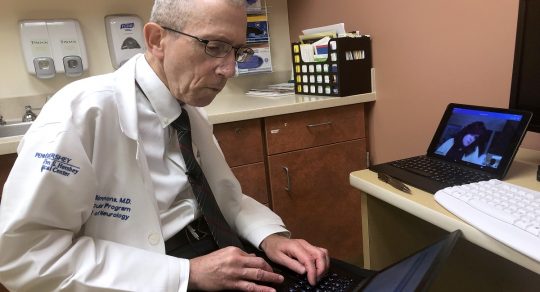College of Medicine
Research
Explore More
Unlocking Human Potential
As a key part of the $1 billion research engine of Penn State, interdisciplinary research is a hallmark of Penn State College of Medicine. Here, experts in the basic sciences and clinicians collaborate to understand the mechanisms of disease, reduce the health disparities facing rural Pennsylvanians, develop next-generation therapeutics and medical devices, utilize advanced imaging and biomedical artificial intelligence, all with the goal to improve health now and for generations to come.

Neurosciences and Addiction
From Parkinson’s to Alzheimer’s and healthy aging to neural network mapping, College of Medicine researchers are exploring the brain and all its functions. Interdisciplinary researchers work together across the basic and clinical research spectrum to increase human understanding of the normal and diseased brain. Scientists are also working to better understand the behavioral and biological underpinnings of substance use disorder and addiction and their effects on individual and community health and well-being; and to identify new prevention and treatment options.

Advancements in Adult and Pediatric Cancer Research
From understanding cancer cell behavior to piloting exercise therapy and clinical trials, scientists and physicians at the College of Medicine take a multifaceted approach to achieving comprehensive cancer discoveries, for the shared purpose of decreasing the impact of cancer in central Pennsylvania and beyond.
By the Numbers
$160M
Research Funding in Fiscal Year 2024
652
Research Awards Granted to Faculty
327
Active Clinical Trials

Population Health in Rural Communities
As Pennsylvania’s only land-grant university, the College of Medicine is committed to improving the health and well-being of communities throughout Pennsylvania. Researchers tackle issues impacting our communities across the state, such as rare cancers, health disparity and substance use disorders. The cross-campus Clinical and Translational Science Institute is leveraging a network of partners to focus translational research on diseases of despair.

Heart and Vascular
Building on a strong legacy of cardiovascular and heart device research, physicians and scientists in Penn State Heart and Vascular Institute continue to conduct research to better understand the causes, physiological effects of and treatment options for a wide range of heart and vascular conditions.
Science in 60 Seconds
Dr. Sinisa Dovat, professor and vice chair for basic science researchin the Department of Pediatrics at Penn State College of Medicine, talks about using precision medicine to develop a new treatment strategy for pediatric leukemia.
View More of Dr. Dovat's Work
Watch on YouTube
Pediatric oncology research at Penn State College of Medicine is making the lives of kids better. Dr. Giselle Sholler, director of pediatric oncology research, talks about their research program's focus areas: Understanding why cancers relapse and how to prevent it, understanding genetics biology through precision medicine, and harnessing the immune system to fight cancer.
Learn More About Dr. Sholler's Work
Watch on YouTube
Yongsoo Kim, associate professor of neural and behavioral sciences at Penn State College of Medicine, talks about his brain mapping research and artificial intelligence.
Read more about Dr. Kim's research
Watch on YouTube
Dr. Alice Zhang, assistant professor of family and community medicine at Penn State College of Medicine, talks about bringing free health resources to the community using "Health to Go" vending machines.
Maxime Caru, PhD, PhD, assistant professor of pediatrics and public health sciences and director of the ONE Group at Penn State College of Medicine, talks about maintaining physical activity after a cancer diagnosis.
Learn More About ONE Group
Watch on YouTube
Researchers at Penn State College of Medicine are finding that GLP-1 receptor agonists, approved for use in diabetes and for weight loss, may also help with addiction.
Learn more about addressing addiction through research and community outreach
Watch on YouTube
With the help of artificial intelligence, scientists like Dr. Ilias Georgakopoulos-Soares, assistant professor of molecular and precision medicine and public health sciences, can develop biomarkers to help detect diseases early.
Watch on YouTube
Dr. Chandrika Behura, associate professor of pediatrics, recently received a $400,000 grant from Hyundai Hope on Wheels for her pediatric oncology research. Here, She talks about the work she has been doing for a decade to investigate what drives resistance to cancer treatments in children, and how her new clinical trial aims to develop novel, precision medicine therapeutics.
Learn More About Dr. Behura's Work
Watch on YouTube
Using hand sanitizer isn't enough to protect you from norovirus. Dr. Aron Lukacher, professor of Cell and Biological Systems and Pathology and Laboratory Medicine at Penn State College of Medicine, explains the science behind this contagious illness.
Watch on YouTube
Director Fornessa Randal talks about the Center for Advancing Health Equity in Rural and Underserved Communities (CAHE-RUC), a unique academic, community-level partnership dedicated to the comprehensive evaluation and implementation of evidence-based, community-level strategies to improve health outcomes in rural and underserved communities.
Dr. Jonathan Foulds, professor of public health sciences and psychiatry and behavioral health, talks about researching the harmful components in tobacco products and the addiction produced by the products.
Learn more about tobacco-related research
Watch on YouTube
Meet Sai Kurapati, a medical student and innovation fellow at Penn State College of Medicine who has a goal of making the recovery period easier for patients after cataract surgery.
Center for Medical Innovation
Watch on YouTube

AI and Bioinformatics
Researchers at the College of Medicine advance the pace of discovery through the development and application of biomedical artificial intelligence, neural engineering, machine learning and clinical informatics. By Leveraging data from imaging, electronic health records, medical insurance claims, genomic and proteomic analysis, wearable technology and social media outlets, researchers are leveraging data science to produce cutting edge scientific discovery.

Seeing is Believing
With state-of-the-art multi-scale imaging equipment and expertise, College of Medicine researchers unlock the building blocks of health by visualizing atoms to whole organisms. Researchers watch in real time as certain proteins, cells, or organs interact with stimuli, adding color and dimension to discovery.

Participate in Research
Researchers at Penn State College of Medicine and Penn State Health strive to make new discoveries to advance scientific knowledge and improve health now and for generations to come.
For patients and the community, we provide opportunities for participation in cutting-edge clinical research.
Research volunteers are protected through rigorous compliance standards, and our StudyFinder searchable database allows those interested in being part of clinical research to find trials.
Conducting Research
Core Facilities & Research Resources
The College has both fully supported institutional facilities and independently-available departmental labs and equipment that can be used or hired to assist investigators in their research.
Research Administration & Offices
Getting a new project up and running can be trying for even the most experienced investigator. At the College of Medicine, we have expert staff available to help guide you through the process.
CTSI Support
Penn State Clinical and Translational Science Institute provides training and support for researchers, including clinical research help and toolkits for research recruitment and Community Health Equity & Engagement Research.
![[object Object]](https://images.ctfassets.net/u5e6iuf5dlnc/sDuEX4P7L58wjmyHOYyj0/c8ab2f6a6259cde67dce787091d87005/SCi60ThumSD2.jpg)
![[object Object]](https://images.ctfassets.net/u5e6iuf5dlnc/3svFUC43Z4X9KvmmVLI9Z8/c576e55eea0030c89208eae73b4507fb/GSholler_RC.00_00_00_00.Still008.jpg)
![[object Object]](https://images.ctfassets.net/u5e6iuf5dlnc/6DUe1Q7OwB6B0AojjyFNU6/2af017f88306b3fbd348ddb1c79f31ab/Sci60-Thumb_YungsooKim.jpg)
![[object Object]](https://images.ctfassets.net/u5e6iuf5dlnc/1FYiGIDlPHjAiqRbv1B3Ts/44a5c726e5f5f56c30be260c25b12e10/Sci60-Thum_AZhang.jpg)
![[object Object]](https://images.ctfassets.net/u5e6iuf5dlnc/7gkgFIWiOYGIIL1Hi8RaUN/98545d95e5bf77393b8c4fb3a565780e/Maxime_Caru_RC.00_00_00_00.Still008.jpg)
![[object Object]](https://images.ctfassets.net/u5e6iuf5dlnc/6l8IJgsXohpQVV6kKsLwYs/8a79c54f4857bd18a1a503a14a4cae59/SCi60ThumSueGrigson.jpg)
![[object Object]](https://images.ctfassets.net/u5e6iuf5dlnc/6Tgx7FgLrYSfmFEZyqkrPG/b13617782bd4963cd0a9cb1d45071338/Ilias_G-S_Rough_Cut.00_00_00_00.Still006.jpg)
![[object Object]](https://images.ctfassets.net/u5e6iuf5dlnc/6C30KQrF5IQg6yi2izzoxG/5941fe141c95b90166fc9f26e7421cce/SCi60ThumCBehura.jpg)
![[object Object]](https://images.ctfassets.net/u5e6iuf5dlnc/5otuIYv0L5Ojbh2UfWEhCt/ffb24869737c6a64567b75c9e7f91a59/A._Lukacher_RC.00_00_00_03.Still006.jpg)
![[object Object]](https://images.ctfassets.net/u5e6iuf5dlnc/3tQ1oRJdC49hSGLbvCCyeX/f96e6de0af58c153d097be50a98be699/SCi60ThumFRandal.jpg)
![[object Object]](https://images.ctfassets.net/u5e6iuf5dlnc/14ok1uqDWhg640Q0fQJRrB/1c4abf65ddade88ec6c6470f73f9bbab/Sci60-Thum_JFoulds.jpg)
![[object Object]](https://images.ctfassets.net/u5e6iuf5dlnc/2SknTKndBUDSC4Qji8akvR/c826154999bb0da7154f61b8266bc752/SCi60ThumSaiKurapti.png)



